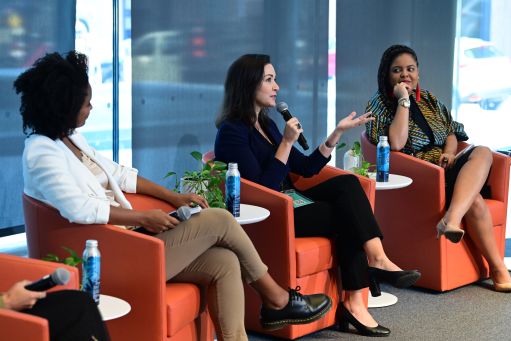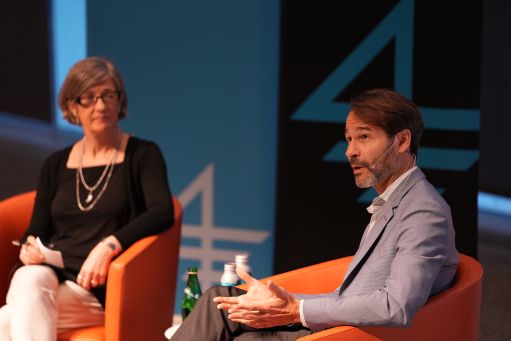Be Yourself in Your Next Selfie
New research shows that authenticity on social media leads to an increased sense of well-being.

In the era of social media, presenting your authentic self to the world has become increasingly complex.
“On social media, users face a choice between presenting their authentic selves or something more desirable or appealing,” says Sheena Iyengar, the S. T. Lee Professor of Business. “It’s a legitimate dilemma that people face.”
After all, life isn’t always a series of perfectly filtered photos taken at a magic hour on a beach with your soul mate.
New research has determined that when compared to being an idealized version of yourself, being authentic on social media results in a greater sense of well-being.
In a recently published paper in Nature Communications, doctoral candidate Erica Bailey, Sandra Matz, the David W. Zalaznick Associate Professor of Business, Iyengar, and Wu Youyou of Northwestern University employ a new term, “quantified authenticity,” to demonstrate that individuals who are truer to themselves in their social media posts also report a greater sense of life satisfaction.
“We thought that this is a unique way to look at not only the feeling of authenticity, but really being authentic in the context of social media,” Bailey says. “Lots of research has considered the average effects of social media use on well-being. Instead, we wanted to ask if there is a way to use social media that can be better or worse for users.”
In one study, the researchers analyzed data from 10,560 Facebook users who took personality tests and had the option of donating their results to the project. The study measured those that demonstrate personality types such as high or low levels of neuroticism, extroversion, and introversion.
The researchers then looked for how closely the respondents’ answers mirror their self-presentation on Facebook.
“If you say you are an introvert, but your social media posts are about going to parties or to happy hour with friends,” Bailey says, “that would be someone who has more distance between their self-view and their expression, or low ‘quantified authenticity’.”
The research shows that such a person has a lower amount of quantified authenticity and life satisfaction.
The other study in the paper involved randomly assigning Columbia University undergraduates to use social media authentically, compared to in a more idealized way, across a number of social media platforms, such as Instagram, Twitter, and Snapchat, as well as Facebook.
Students in the study were divided into two groups. The first were told to look at their results and be authentic to themselves in their social media posts for a week. The other group, after receiving their results, were told to post in a way that would be most socially desirable to others. After a week, the researchers asked the groups to swap.
“We found most profound effects in the second week,” Bailey says. “We found that when participants changed from being authentic to being idealized, they had lower well-being and vice versa.”
With its thumbs-ups and heart emojis, there is a great importance given to the social feedback that users receive, especially if their posts harmonize with users’ authentic perception of themselves. But social media is not always the most convivial place, and the researchers hope to continue to explore how the broader social context impacts authenticity.
“If the feedback I get on social media for being authentic is pure backlash,” Matz says, “then this is going to make it a lot harder for me to express my authentic self. It is almost impossible to disentangle the effect of authenticity on well-being from the social feedback we get.”
Iyengar says that research into social media’s effect on authenticity has implications for the development of leadership skills and that there are benefits to “not pretending.”
“Authentic leadership gives people comfort,” she says. “It can predict who you are and how you will make choices in the future.”
Additionally, Matz notes that the relationship between authenticity and social media also affects the multiplicity of identities that people inhabit.
“Being authentic does not imply that you fit into a box and you’re only one person,” she says. “It is more about being able to express all different parts of your identity that are relevant in a particular moment.”
More Features

Can We Curb Fake News? Smart Research May Provide the Answer
Professor Gita Johar shares research insights on why it spreads, spotting who shares it, and a multi-pronged approach to reduce it.

‘We Are Bigger Than Our Problems’
Three takeaways from the 2022 Brazil Climate Summit held at Columbia Business School’s Manhattanville campus

Four Investment Strategies to Combat Climate Change
CBS professor Bruce Usher discusses his book and its most important takeaways for investors.

Climate Week NYC: CBS Experts Weigh In on Smart Incentives, Solutions in the Fight Against Climate Change
As the annual event designed to drive climate action marks its 14th year, here’s what our faculty members had to say about the most pressing issues.
Rise to the challenge.
The COVID-19 pandemic has changed the world of business, while bringing historical inequities and injustice into sharp relief.
Subscribe to Leading Through Change to receive the latest insights from Columbia Business School to help you navigate this unprecedented time.


